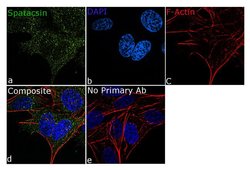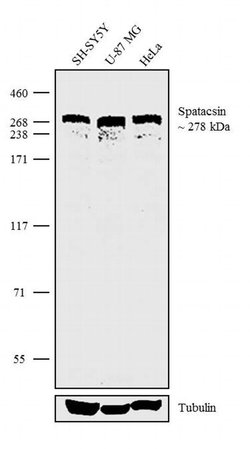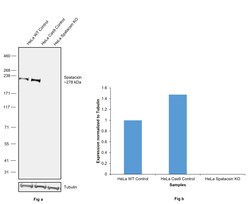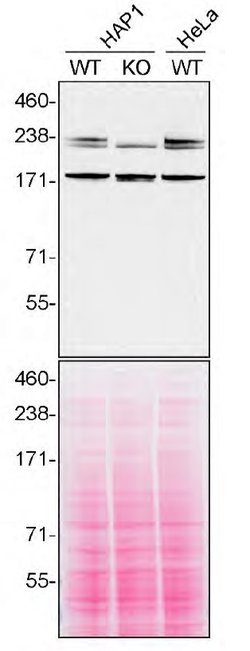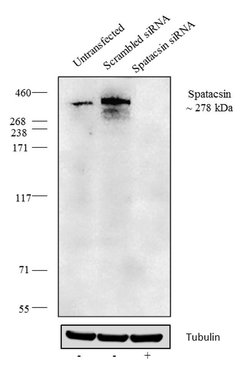Learn More
Invitrogen™ SPG11 Recombinant Superclonal™ Antibody (2HCLC)
Rabbit Recombinant Superclonal Antibody
Supplier: Invitrogen™ 711811

Description
This antibody is predicted to react with Monkey, Horse, Bovine, Sheep Recombinant rabbit Superclonal™ antibodies are unique offerings from Thermo Fisher Scientific. They are comprised of a selection of multiple different recombinant monoclonal antibodies, providing the best of both worlds - the sensitivity of polyclonal antibodies with the specificity of monoclonal antibodies - all delivered with the consistency only found in a recombinant antibody. While functionally the same as a polyclonal antibody - recognizing multiple epitope sites on the target and producing higher detection sensitivity for low abundance targets - a recombinant rabbit Superclonal™ antibody has a known mixture of light and heavy chains. The exact population can be produced in every lot, circumventing the biological variability typically associated with polyclonal antibody production. Note: Formerly called Recombinant polyclonal antibody, this product is now rebranded as Recombinant Superclonal™ antibody. The physical product and the performance remain unchanged.
Hereditary spastic paraplegias (HSPs) are genetically and phenotypically heterogeneous disorders. Spastic paraplegia with thinning of the corpus callosum (ARHSP-TCC) is a relatively frequent form of complicated hereditary spastic paraplegia (cHSP) in which mental retardation and muscle stiffness at onset are followed by slowly progressive paraparesis and cognitive deterioration. Mutations of the SPG11 gene encoding the spatacsin protein have been identified as a major cause of HSP-TCC. Spatacsin is a potential transmembrane protein that is phosphorylated upon DNA damage. It is expressed in all structures of the brain, with a high expression in the cerebellum. SPG11 mutations may occur more frequently in familial than sporadic forms of cHSP without TCC. Kjellin syndrome is found to be associated with mutations in not only the SPG15 gene but also SPG11 gene. Recent studies show Parkinsonism may initiate SPG11-linked HSP TCC and that SPG11 may cause juvenile Parkinsonism.
Specifications
| SPG11 | |
| Recombinant Superclonal | |
| 0.5 mg/mL | |
| PBS with 0.09% sodium azide; pH 7.4 | |
| Q96JI7 | |
| SPG11 | |
| Peptide corresponding to human SPG11 (aa873-aa892). | |
| 100 μg | |
| Primary | |
| Human | |
| Antibody | |
| IgG |
| Western Blot, Immunocytochemistry | |
| 2HCLC | |
| Unconjugated | |
| SPG11 | |
| 6030465E24Rik; A330015I11; ALS5; C530005A01Rik; CMT2X; Colorectal carcinoma-associated protein; KIAA1840; RGD1562529; spastic paraplegia 11; spastic paraplegia 11 (autosomal recessive); spastic paraplegia 11 protein; Spastic paraplegia 11 protein homolog; spatacsin; Spg11 | |
| Rabbit | |
| Protein A | |
| RUO | |
| 80208 | |
| Store at 4°C short term. For long term storage, store at -20°C, avoiding freeze/thaw cycles. | |
| Liquid |
The Fisher Scientific Encompass Program offers items which are not part of our distribution portfolio. These products typically do not have pictures or detailed descriptions. However, we are committed to improving your shopping experience. Please use the form below to provide feedback related to the content on this product.
